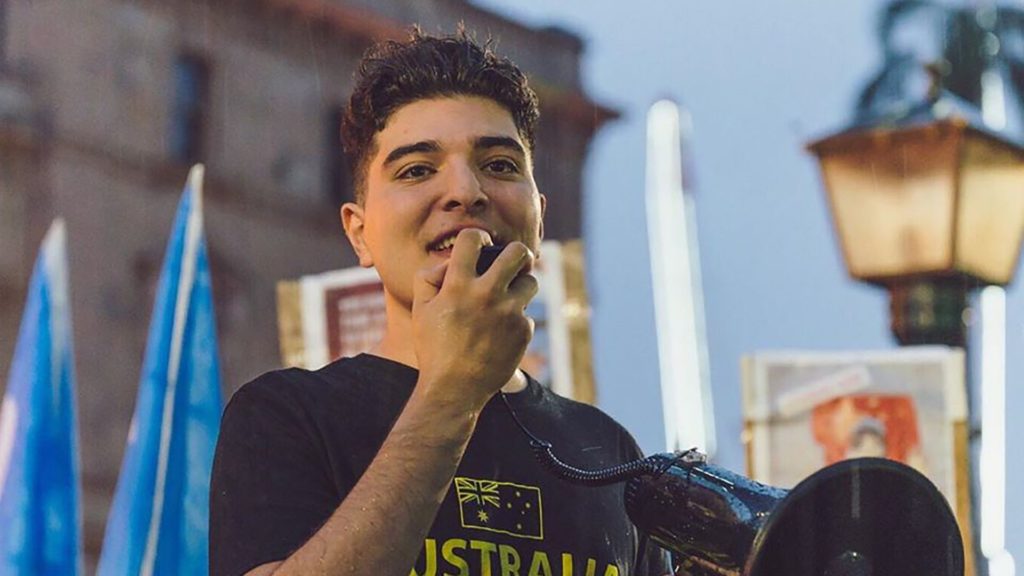Drew Pavlou may well be on the way to becoming the “world’s most famous undergraduate” for his outspoken criticism of the People’s Republic of China’s (PRC) treatment of its Uyghur community and Hong Kong but he is also a final year student who may not be allowed to complete his studies at the University of Queensland (UQ).
Last Wednesday, Mr Pavlou and his barrister, Tony Morris QC, walked out of UQ misconduct hearing which he said was heavily biased against him and that it had not followed due process. His team also claimed that it was denied access to documents that would have shown collusion between the PRC government and the university.
Mr Pavlou, who was elected to UQ Senate late last year, was to face 11 allegations of misconduct which he said were politically motivated and for which he could be expelled from the university.
“The hearing breached a number of rules regarding procedural fairness. We were refused access to documents that were relevant to the case. It was like facing your accuser, judge and executioner,” Mr Pavlou told Neos Kosmos.
SBS.com quoted Mr Morris as saying “ two of the three members of the disciplinary panel should step aside over ‘perceived apprehension of bias’ because they are paid employees of the university.”
“Mr Morris advised it was better to walk out of the hearing than to give it legitimacy it did not deserve,” Mr Pavlou told Neos Kosmos.
He said a decision on whether he would be expelled from UQ was expected soon. If he is expelled he is prepared to fight the decision in the state’s Supreme Court. Which he said was an independent court of law.
“I was planning to graduate at the end of the year. I am so far behind in my classes and I cannot even think or study right now,” he said.
The consequences of being expelled would be catastrophic for him as he would not be able to carry any of the credits he has acquired over his years of study at UQ to another university and he would also forfeit the $35,000 that had gone towards his university studies in philosophy, literature and history.
He said that he would continue to be a student until the process was finalised after an appeal was heard.
Efforts by Neos Kosmos to draw a response from UQ were directed to its UQ Responds website.
UQ stated on the website on 20 May that: “Unsubstantiated claims that the University coordinated its public response to the student protest on 24 July 2019 with the Chinese Consulate are ludicrous and the University strongly rejects them.
“These claims are also demonstrably inaccurate and are irrelevant to any current disciplinary process.
It went on to say that: “‘The message (for its response) was approved without any changes, and emailed to the Consulate and copied to the Confucius Institute at 7.05pm. The Vice-Chancellor was not in contact with the Consulate on this matter. In addition, the University also communicated its position to a number of other stakeholders including government, partners and the sector’s peak bodies.”
In another statement on the same day it said: “The University’s policies are not driven by politics, and we completely reject the claims that this ongoing disciplinary matter is a free speech issue; student disciplinary matters are initiated in response to complaints made to the University.”
Last year, on 24 July, Mr Pavlou had been one of the organisers of a protest against the treatment of protesters in Hong Kong. The gathering took a bad turn when supporters of the PRC government gathered and police had to be called in to quell the situation.
The PRC consular general in Brisbane, Dr Xu Jie who is also the adjunct professor at the UQ Confucius institute issued a statement on the consular website: “The Consulate-General regards highly the importance of the safety of the overseas Chinese students and affirms the self-motivated patriotic behaviour of the overseas Chinese students. The Consulate-General resolutely opposes to [sic] any conduct by words or behaviour to split the country … and to incite anti-China behaviour.”
Mr Pavlou was named as one of the protest organisers in the PRC state-owned Global Times and in Australia-based Chinese media. He was attacked on social media and was verbally threatened.
The net result was that he issued a summons against Dr Jie to appear at Brisbane magistrate’ court under Queensland’s Peace and Good Behaviour Act. The case which was to have been heard in April was deferred to 24 July because of the COVID-19 measures.
“A year to the day when Mr Pavlou was involved in the UQ campus protest,” noted Mark Tarrant, the lawyer representing Mr Pavlou inthe Magistrate’s Court hearing.
Mr Tarrant said that both parties in the case would have to appear in July. He said Dr Jie was a consular official whose actions went beyond his consular duties so that he could not claim diplomatic immunity.
In another twist in this complex tale, The Guardian reported on Tuesday (26 May) that Mr Pavlou’s legal team had lodged a formal complaint with UQ and called on it to dismiss Dr Jie from his role as as an adjunct professor at the university’s school of languages and culture.
In his letter to UQ, Mr Trarrant wrote: “Dr Xu Jie’s documented serious … conduct has resulted in multiple breaches of the [Queensland] Public Sector Ethics Act and the University of Queensland code of conduct.
Mr Tarrant went to say in the letter that: “Dr Xu Jie’s inflammatory statement of 25 July, 2019, praising and inciting violence against peaceful University of Queensland student protestors meets the definition of ‘serious misconduct’ as defined by … Fair Work regulations.”
Asked about whether it was wise to be provocative when he was confronted by such a complex legal situation, Mr Pavlou replied that he wanted to demonstrate that would could speak freely in Australia.
“If we have to censor ourselves do we even have free speech? I do things in a provocative way because then they cannot ignore what I have to say. We should be able to say what we think without fear.
“No activist achieved anything without rocking the boat. You have to rock the boat in order to see what is going on underneath,” said Mr Pavlou.








